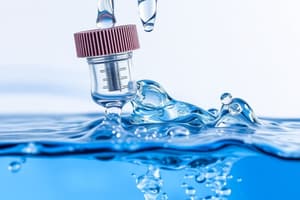Podcast
Questions and Answers
What does Pascal's Law state regarding pressure in an enclosed fluid?
What does Pascal's Law state regarding pressure in an enclosed fluid?
- Pressure applied to the fluid is transmitted undiminished to every portion of the fluid and its walls. (correct)
- Pressure increases proportionally to the volume of the fluid.
- Pressure can only be measured at one point within the fluid.
- Pressure is inversely related to the depth of the fluid.
What is the SI unit of pressure?
What is the SI unit of pressure?
- Newton per square meter (N/m²)
- Kilopascal (kPa)
- Pascal (Pa) (correct)
- Atmosphere (atm)
How is gauge pressure defined mathematically?
How is gauge pressure defined mathematically?
- P_g = P - P_a (correct)
- P_g = P + P_a
- P_g = P_a + P
- P_g = P_a / P
What does viscosity measure in a fluid?
What does viscosity measure in a fluid?
What is Stokes' Law used for?
What is Stokes' Law used for?
What factor(s) does Bernoulli's Equation depend on?
What factor(s) does Bernoulli's Equation depend on?
What does Reynold's Number help predict?
What does Reynold's Number help predict?
Hydraulic machines operate based on which principle?
Hydraulic machines operate based on which principle?
Flashcards
Fluid Pressure
Fluid Pressure
Force per unit area exerted by a fluid.
Pascal's Law
Pascal's Law
Pressure applied to a fluid in a closed container is transmitted equally to every point.
Viscosity
Viscosity
A fluid's resistance to flow.
Surface Tension
Surface Tension
Signup and view all the flashcards
Bernoulli's Equation
Bernoulli's Equation
Signup and view all the flashcards
Reynolds Number
Reynolds Number
Signup and view all the flashcards
Hydrostatics
Hydrostatics
Signup and view all the flashcards
Atmospheric Pressure
Atmospheric Pressure
Signup and view all the flashcards
Study Notes
Fluid Properties
- Fluids are substances capable of flowing, encompassing liquids and gases.
- Hydrostatics studies fluids at rest, while hydrodynamics studies fluids in motion.
Pressure
- Pressure is the normal force per unit area (measured in Pascals).
- Pascal's Law states pressure in an enclosed fluid is transmitted uniformly.
- Atmospheric pressure is the pressure from the atmosphere, approximately 1.013 x 105 Pa.
- Gauge pressure is relative to atmospheric pressure (Gauge Pressure = Absolute Pressure - Atmospheric Pressure).
Viscosity
- Viscosity quantifies a fluid's resistance to flow between layers (analogous to friction in solids).
- Stokes' Law describes the force needed to move a sphere through a viscous fluid at low speed (Force = 6πηrv, where η is the viscosity, r is the radius, and v is the velocity).
Surface Tension
- Surface tension is the force per unit length acting on a liquid's surface in contact with another substance (due to cohesive forces).
- Surface energy is the work needed to increase a liquid's surface area (Surface Energy = Surface Tension x Change in Area).
Bernoulli's Principle
- Bernoulli's Equation describes energy conservation in flowing fluids (Pressure + 1/2 * Density * Velocity2 + Density * Gravity * Height = constant).
Reynold's Number
- Reynold's Number (Re) is a dimensionless number predicting fluid flow patterns (Re = (Density * Velocity * Characteristic Dimension) / Viscosity).
Applications
- Hydraulic machines utilize Pascal's Law for applications like brakes and lifts.
- Capillary rise is the phenomenon where liquids rise or fall in narrow tubes due to surface tension and adhesive forces.
Studying That Suits You
Use AI to generate personalized quizzes and flashcards to suit your learning preferences.




